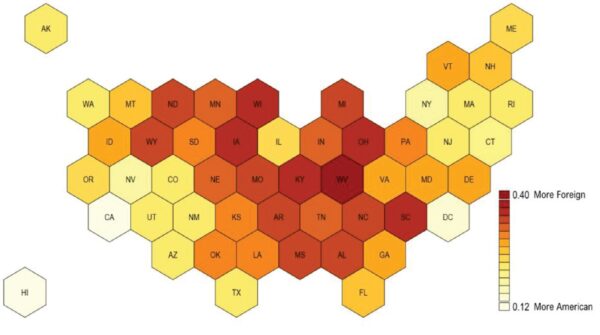 Back in September, New York University (NYU) released this press release regarding a recent study:
Back in September, New York University (NYU) released this press release regarding a recent study:
“The researchers found that Republican-majority and swing states showed indications of greater stereotyping of Asian-born and Asian Americans, with European Americans more likely to see them as foreign. Such states with high implicit bias included West Virginia, Iowa, South Carolina, Ohio, and Wisconsin.
At the same time, states with older median ages and greater percentages of Asians were associated with the less explicit bias against Asians and Asian Americans. These included Hawaii, the District of Columbia, California, Nevada, and Texas, according to the study.
Nari Yoo, a PhD candidate in the NYU Silver School of Social Work, led the data-driven research, newly published by the American Sociological Assocition (ASA) journal Socius. The study is titled “Mapping Anti-Asian Xenophobia: State-level Variation in Implicit and Explicit Bias against Asian Americans across the United States.” Coauthors include Professor Harvey Nicholson Jr. of the University of Toronto-St. George Campus, Professor Doris Chang of NYU Silver, and Professor Sumi Okazaki of NYU Steinhardt.
“Our study shows that experiences of Asians and Asian Americans are likely to significantly differ depending on their state of residence, with residents of some states expressing more biased views that Asian Americans are not as ‘American’ as whites,” Yoo says. “These insights should guide future research and interventions to address biases effectively at the state level.”
Violent assaults and verbal abuse against Asian Americans climbed during the peak of the COVID pandemic, bringing heightened attention as well as research to the problem. In order to improve understanding of Asian Americans’ diverse experiences of racism, Yoo and her coauthors in this study looked at state-level variations in implicit and explicit bias, as well as macro-level factors, such as racial density, political climate, and socioeconomic conditions that have been shown to influence racial attitudes.”
Not exactly rocket science if you ask me, but good to know that such research is being done. Given the anti-immigrant rhetoric by Trump and the Republican Party, it’s no big surprise.
- Excited
- Fascinated
- Amused
- Disgusted
- Sad
- Angry








